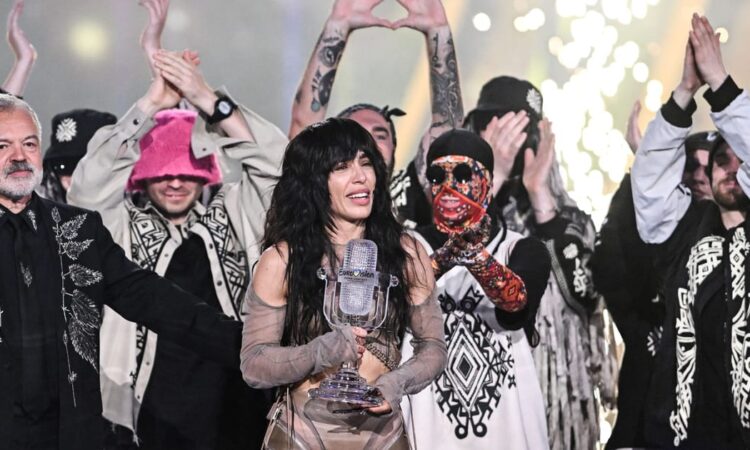
Amid the feather dresses, smoke machines, self-playing pianos and more LED lights and sequins than you could shake a stick at, a powerful vocal performance, a plinth and some truly incredible nail artistry clinched Eurovision 2023 for Sweden.
Lorine Zineb Nora Talhaoui, known as Loreen, delivered a note-perfect rendition of her song “Tattoo” — and with it, propelled Sweden to equal Ireland as the two most successful countries in the colorful competition’s history, each with seven wins.
But at a contest created to bring European countries together with song, glitz and glamor after they were torn apart by World War II, the specter of Russia’s full-scale invasion of Ukraine hung over proceedings.
Just minutes before Ukrainian act Tvorchi took to the Eurovision stage, reports emerged that Russia had attacked its home city of Ternopil in Ukraine’s west, around three hours’ drive from the Polish border. It cast a somber hue over an event known as much for bombastic outfits and ludicrous staging as it is for song-writing and vocals.
“Ternopil is the name of our hometown, which was bombed by Russia while we sang on the Eurovision stage about our steel hearts, indomitability and will,” Tvorchi, an electronic music duo made up of Andrii Hutsuliak and Jeffery Kenny, said in a post on Instagram after their performance. “This is a message for all cities of Ukraine that are shelled every day. Kharkiv, Dnipro, Khmelnytskyi, Kyiv, Zaporizhzhia, Uman, Sumy, Poltava, Vinnytsia, Odesa, Mykolaiv, Chernihiv, Kherson and all others. Europe, unite against evil for the sake of peace!”
Tvorchi performed “Heart of Steel” on a stage lit up with a Ukrainian trident, or tryzub, in the national colors of yellow and blue. The song title is a nod to the Azovstal steel plant in Mariupol, where a small band of Ukrainian soldiers held out against a Russian siege for weeks last year in horrific conditions.
Organizers of the annual song contest insist that Eurovision “shall in no case be politicized and/or instrumentalized.” For that reason, the European Broadcasting Union blocked Ukrainian President Volodymyr Zelenskyy from delivering an address at the final, citing the need to keep things apolitical. But acts have long found ways to get around the rules, with oblique political statements.
Tvorchi, which ended up in sixth place in the 2023 contest, was seeking Ukraine’s second Eurovision win in a row, after Kalush Orchestra won last year.
As reigning champions, Ukraine would usually have hosted this year’s contest. But amid Russia’s ongoing invasion, organizers turned to 2022 runners-up the U.K. to hold the contest on Ukraine’s behalf. Liverpool, the home of The Beatles, was subsequently selected as the host city; Russia is banned from the competition.
There were nods to Ukraine’s plight throughout the evening, along with a medley of famous musical contributions from Liverpool and a moving rendition of “You’ll never walk alone,” a song synonymous with the city.
Catherine, the princess of Wales, made the second royal Eurovision cameo, dressed in a flowing ballgown in a brilliant shade of Ukrainian blue and playing the piano in a star-studded opening rendition of Kalush Orchestra’s winning song “Stefania.” (King Charles III and Queen Camilla were featured in a video sequence in the semi-finals.)
Loreen, the hot favorite going into the 67th Eurovision final and the winner of the song contest in 2012, became only the second artist to notch up two of the coveted trophies, joining Ireland’s Johnny Logan. Fan-favorite Finland came second, while Israel took third place.
For the first time, people from non-participating nations could vote in the contest, with the public vote making up 50 percent of the overall result, along with the verdicts of juries from participating nations, comprised of music industry professionals.
Sweden built up a 163-point lead following the jury votes, but Finland, which ranked fourth, jumped to the top of the pile after winning 376 points from the public. Needing 187 public votes to win, Sweden, the last country to be announced, secured 243, ensuring a relatively comfortable victory despite an initial scare.
Sweden famously first won the contest in 1974, when quartet ABBA performed “Waterloo,” with the country’s most recent victory coming in 2015.
Norway jumped up the leaderboard after the public vote, finishing fifth, while the likes of France, Belgium and Spain failed to build on their solid showing in the jury round of voting.
An audience of 7,000 filled Liverpool’s M&S Bank Arena, draped in national flags, waving glow sticks and going absolutely crazy for, among other crowd favorites, Finland’s song, “Cha Cha Cha.”
Some 26 nations took part in Saturday’s grand final, after two semi-finals this week saw Ireland, Malta, Azerbaijan, Latvia, the Netherlands, Romania, Denmark, Georgia, Iceland, San Marino and Greece eliminated.
The U.K., France, Spain, Germany and Italy, known as the Big 5, qualified for the final automatically as the countries that make the largest financial contributions to the organization of the contest via their respective broadcasters. The U.K. swapped being runner-up in 2022 to finishing second-last this year.
Sweden, as the winner, will host next year’s event.






